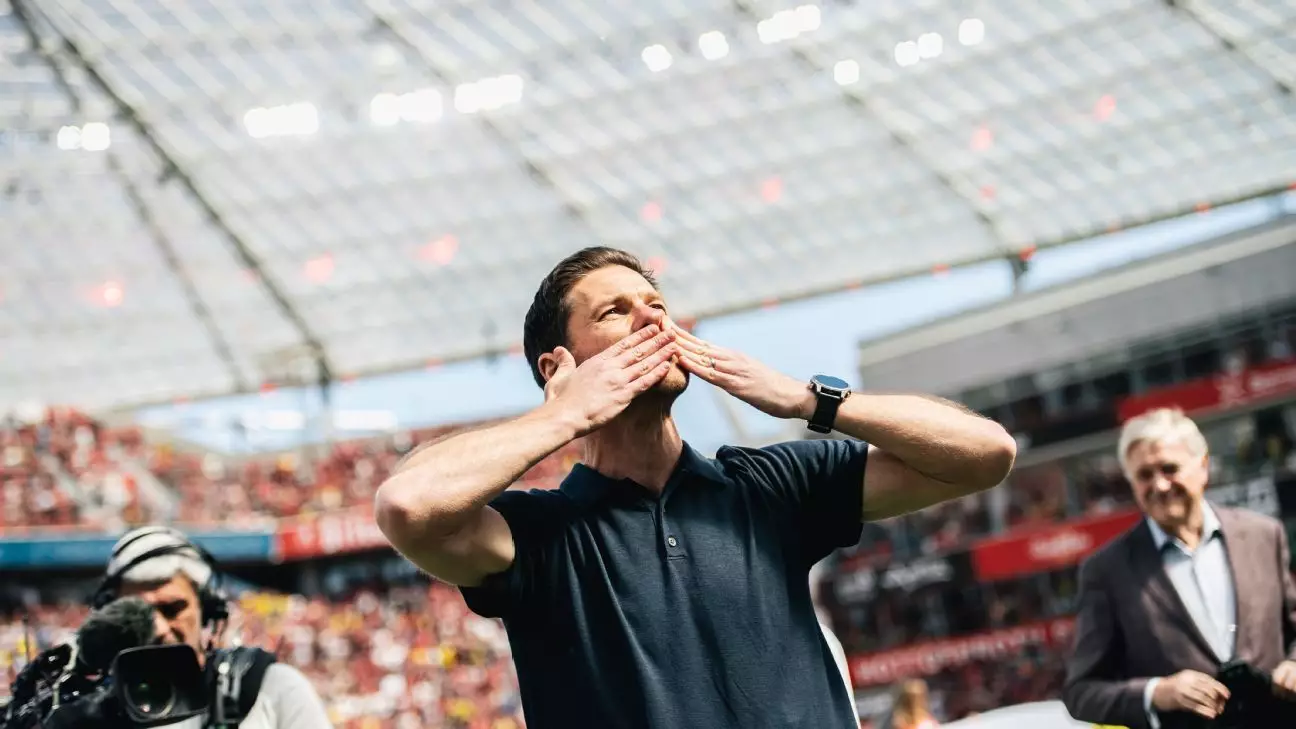In a dramatic denouement, Bayer Leverkusen’s cherished coach Xabi Alonso experienced a bittersweet farewell during his final home match, marked by a staggering 4-2 defeat against Bundesliga giants Borussia Dortmund. This loss was not merely a statistical fail; it embodied the painful contrasts that define a coach’s legacy. While the scoreboard told one story, the emotional narrative was woven through the glimpses of appreciation from the supporters as Alonso bid adieu after three transformative years at the helm.
Alonso’s swan song was a cacophony of joy and despair: moments of brilliance overshadowed by the glaring shortcomings that plagued the team’s performance in this crucial match. The reality dawned that even the most tactically astute mind could not fortify every weakness. The defeat knocked Leverkusen’s confidence as they found themselves overshadowed in the race for Champions League qualification, with Dortmund’s Karim Adeyemi proving to be the decided swordsman of the afternoon. An astute observer of football dynamics could sense the palpable tension as Alonso waved his heartfelt goodbyes, a symbolic embrace between a coach who had transformed the club and a passionate fan base that would forever remember him.
The Lasting Impact of Xabi Alonso
In his post-match reflections, Alonso expressed mixed emotions—pride, gratitude, and a touch of melancholy. “We had many experiences. Luckily most of them good ones,” he remarked, showcasing the wisdom acquired over his tenure. His contribution to Leverkusen transcended the tangible trophies; Alonso infused the club with tactical innovation, instilled discipline, and nurtured the talents of young players like Florian Wirtz. By forging a new identity, he brought Leverkusen from the shadows into a vibrant light of competitiveness.
The team’s spirited first-half performance bore all the hallmarks of Alonso’s playful style—quick transitions, creativity, and attacking flair—but frustration loomed large as the brilliant saves from Dortmund’s Gregor Kobel denied several golden opportunities. However, the match was not simply about goals conceded but the missed chances of epitomizing a farewell worthy of their leader. It showcased the harsh reality of football, where potential often collides with mediocrity. The disconnect in the second half highlighted the volatility present throughout the season and ultimately underscored a need for Leverkusen to reassess their approaches moving forward.
The Painful Farewell to a Grimm Reality
The celebration of Alonso’s legacy was slightly marred by this unexpected defeat—after all, how could a coach depart knowing that the final impression was so jarring? In post-match moments that felt almost surreal, supporters flooded the pitch, echoing their gratitude while navigating a complex mixture of emotions—a closure that felt more like an unfinished narrative. As emotions surged, one had to consider: Would this leave an indelible mark on the players? Each moment from the past three years, particularly during moments like this, needs to be carefully examined, as it will shape their direction under new leadership.
Fans would cling to memories—Wirtz’s inspirational performances, the energy surrounding cup victories, and the majestic moments against high-profile opponents. Yet, amid this nostalgia, crucial questions loomed: What will Leverkusen become in the post-Alonso era? As the shadows of the current campaign wane, they must confront the ambition flickering within—can they transcend this defeat and rebuild?
Eyes on the Future
Borussia Dortmund’s performance exemplified the clinical efficiency that can fracture morale in any opponent. As they aim for Champions League qualification, one can’t help but admire the poise and structure that define their style—elements that Leverkusen pursue under Alonso’s influence. The tactical mastery displayed by Dortmund serves as a benchmark, urging Leverkusen to recalibrate their ethos.
As fans prepare for a new chapter, the aftershocks of Alonso’s departure will resonate for years to come. The challenge lies ahead: harnessing the lessons learned into a new narrative. The question remains—will the club capitalize on this transition, or will Alonso’s exit reveal lingering vulnerabilities that could unravel the foundation he fought so hard to build? In the world of football, where legacies are continually rewritten, it is the indomitable spirit of the club that will ultimately determine whether Xabi Alonso’s impact was a fleeting moment or the genesis of a renaissance.

